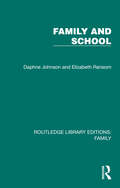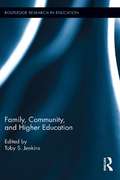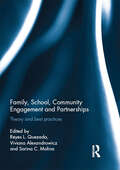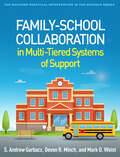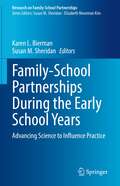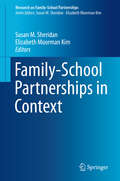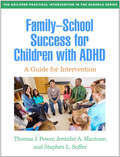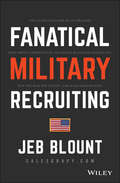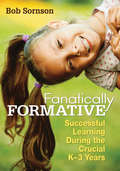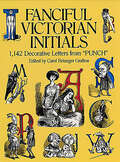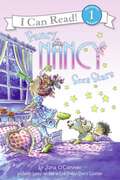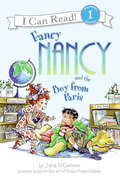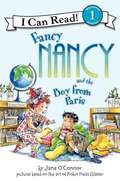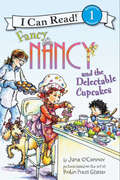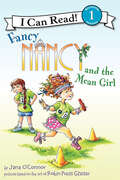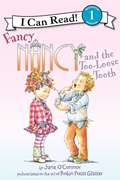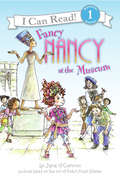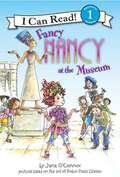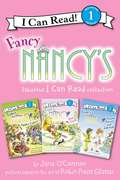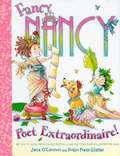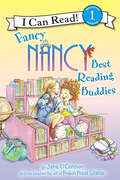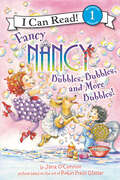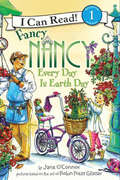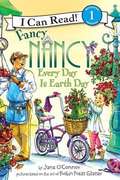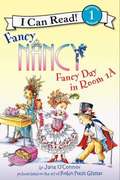- Table View
- List View
Family and School (Routledge Library Editions: Family)
by Elizabeth Ransom Daphne JohnsonOriginally published in 1983, this book offers a perspective on the secondary school years from the standpoint at home. In the early 1980s as now, there was no shortage of advice to parents on how they should bring up their children, and what their relationship should be with the schools their children attended. More rarely heard was the parent’s voice of experience on the stages of family life and how the children’s school life is seen from the family point of view. The purpose of this book was to urge reconsideration of taken-for-granted assumptions about the appropriate relationship between home and secondary school. It can be read today in its historical context.
Family, Community, and Higher Education (Routledge Research in Education #89)
by Toby S. JenkinsThis book explores social topics and experiences that illustrate the various ways in which the family unit influences and impacts college students. In the text, the authors not only explore family memories, but also challenge the traditional lack of inclusion and appreciation for “family” as knowledge producers and educational allies. This book spotlights the family unit as a critical factor within the educational experience—one that prepares, supports, and sustains educational achievement through both everyday simple lessons and critical and difficult family challenges. Through these experiences, families teach the lessons of survival that often help students to persist in college.
Family, School, Community Engagement and Partnerships: Theory and Best Practices
by Reyes L. Quezada, Viviana Alexandrowicz and Sarina C. MolinaHow can colleges and schools support the inclusion of family, school and community engagement curricula in teacher and administrator preparation programs? The contributions in this book try to answer this question, with contributors describing their experiences, their programs, and their support for the goal of enhancing parental involvement and engagement in Schools and Colleges of Education. The authors and researchers, such as Joyce Epstein, who is the foremost researcher on the topic, have the knowledge and expertise in family, school, and community engagement and partnerships from both theory and best practice perspectives. The book is designed to be interactive, and readers are encouraged to engage themselves in the conversation. Readers are invited to e-mail any of the editors to discuss the questions posed. This book was originally published as a special issue of Teaching Education.
Family-School Collaboration in Multi-Tiered Systems of Support (The Guilford Practical Intervention in the Schools Series)
by Mark D. Weist S. Andrew Garbacz Devon R. MinchFamily–school collaboration has proven benefits for students&’ social, emotional, behavioral, and academic functioning, yet many schools struggle to create and sustain effective partnerships with families. This timely resource provides an equity-focused, culturally responsive framework for embedding family collaboration within multi-tiered systems of support (MTSS). The field-leading authors present best practices for involving families in data-based decision making and problem solving at Tiers 1, 2, and 3. Chapters from guest experts address key issues in implementation, including detailed case studies. In a convenient large-size format, the book provides implementation guides, practitioner vignettes, candid parent quotations, and reproducible checklists, forms, and sample scripts that can be downloaded and printed. This book is in The Guilford Practical Intervention in the Schools Series, edited by Sandra M. Chafouleas.
Family-School Partnerships During the Early School Years: Advancing Science to Influence Practice (Research on Family-School Partnerships)
by Susan M. Sheridan Karen L. BiermanThis book presents research-based family-school intervention programs that target the specific developmental period of preschool through the early elementary years, focusing on promoting positive child transitions into school. It explores critical intervention issues, including the need to understand mechanisms of efficacy, issues with real-world implementation, and methods for scaling family-school interventions. The volume references developmental research to highlight the importance of family-school partnerships at this critical transition period. Several chapters briefly describe research on proven intervention models that are effective in promoting family-school partnerships as children enter kindergarten and foster positive school outcomes. Each chapter concludes with a review of the most critical next steps in family-school intervention research within the context of the early school years. At the end of the book, several commentary chapters address overall implications for future research and methods for advancing the field, including perspectives on research-informed family-school practices and policies. Not only does the volume highlight interventions that work effectively to engage families with schools, it focuses on identifying critical components and processes that may underlie effective intervention outcomes and offers agendas for future research and intervention diffusion efforts. Key topics of coverage include: Presenting the logic model of the intervention program.Exploring questions concerning critical elements of family-school partnerships that may account for children’s positive outcomes.Discussing the challenges and strategies for scalability and broad diffusion. Family-School Partnerships During the Early School Years is a valuable resource for researchers, professionals and graduate students in child and school psychology, educational policy and politics, family studies, developmental psychology, sociology of education, sociology, and anthropology.
Family-School Partnerships in Context
by Susan M. Sheridan Elizabeth Moorman KimThis volume focuses on context considerations in family-school partnership research. The book examines how cultural diversity, including differences in parenting (e. g. , race, education, family history) and diverse school variables (e. g. , location, population, organization,) can affect family-school partnerships. Its bio ecological perspective pinpoints critical areas that studies need to address for real-world utility, such as parental commitment and developmental considerations. Although the book's focus is research, chapters present program designs and evaluations along with ideas for community involvement and policy. The authors also explore the changing landscape for home-school partnerships resulting from the impact of technology, which is rapidly becoming a central player in organizing research and bringing interventions to life. Topics covered include: Complexities in field-based partnership research. Family-centered, school-based interventions. A district leadership approach to school, family and community partnerships. Research issues to forward a policy agenda supporting family-school partnerships. Testing statistical moderation in research on home-school partnerships. Integrating current and evolving knowledge toward future directions for research. Contexts of Family-School Partnerships is a valuable resource for researchers, professionals and graduate students in child and school psychology, educational policy and politics, family studies, developmental psychology, sociology of education, sociology and anthropology.
Family-School Success for Children with ADHD: A Guide for Intervention (The Guilford Practical Intervention in the Schools Series)
by Thomas J. Power Jennifer A. Mautone Stephen L. SofferDistilling decades of research, this practical manual presents an innovative intervention for families of 6- to 10-year-olds (grades 1–5) with attention-deficit/hyperactivity disorder (ADHD). Family–School Success (FSS) focuses on improving children's behavior and academic performance by strengthening parent–child, teacher–student, and family–school relationships. Detailed guidelines are provided for implementing FSS with parent groups or individual families, including how to involve children in groups and collaborate with teachers. The authors discuss ways to deliver FSS effectively in school- and clinic-based settings, private practice, and primary care. In a convenient large-size format, the book features dozens of reproducible parent handouts and worksheets, assessment tools, and fidelity checklists, which can also be downloaded and printed. This book is in The Guilford Practical Intervention in the Schools Series, edited by Sandra M. Chafouleas.
Fanatical Military Recruiting: The Ultimate Guide to Leveraging High-Impact Prospecting to Engage Qualified Applicants, Win the War for Talent, and Make Mission Fast
by Jeb BlountMilitary Recruiting is a war. It’s just a different kind of war than what you were prepared and trained to fight for. Recruiting is a war for talent. Smart, competent, and capable people are rare and in high demand. Every organization, from commercial enterprises, healthcare, non-profit, sports, and education, to the military is in an outright battle to recruit and retain these bright and talented people. Rather than bullets and bombs, the war for talent is won through high-impact prospecting activity, time discipline, intellectual agility, emotional intelligence, and human to human relationships. On this highly competitive, ever changing, asymmetrical battlefield, to win, you must operate at a level of excellence beyond anything asked of military recruiters before. Yet, in this new paradigm, many recruiters are struggling, and most recruiting units are staring down the barrel at 50 percent or more of their recruiters consistently missing Mission. It is imperative that we arm military recruiters with the skills they need to win in this challenging environment. The failure to make Mission is an existential threat to the strength and readiness of America’s fighting forces and our democracy. Fanatical Military Recruiting begins where the Recruiting and Retention colleges of the various branches of the military leave off. It is an advanced, master’s level training resource designed specifically for the unique demands of Military Recruiting. In FMR, you’ll learn: The Single Most Important Discipline in Military Recruiting How to Get Out of a Recruiting Slump The 30-Day Rule and Law of Replacement Powerful Time and Territory Management Strategies that Put You in Control of Your Day The 7 Step Telephone Prospecting Framework The 4 Step Email and Direct Messaging Framework The 5 C’s of Social Recruiting The 7 Step Text Message Prospecting Framework How to Leverage a Balanced Prospecting Methodology to Keep the Funnel Full of Qualified Applicants Powerful Human Influence Frameworks that Reduce Resistance and Objections The 3 Step Prospecting Objection Turn-Around Framework Mission Drive and the 5 Disciplines of Ultra-High Performing Military Recruiters In his signature right-to-the-point style that has made him the go-to trainer to a who’s who of the world’s most prestigious organizations, Jeb Blount pulls no punches. He slaps you in the face with the cold, hard truth about what’s really holding you back. Then, he pulls you in with stories, examples, and lessons that teach you exactly what you need to do right now to become an ultra-high performing recruiter. Fanatical Military Recruiting is filled with the high-powered strategies, techniques, and tools you need to keep your funnel packed with qualified applicants. As you dive into these powerful insights, and with each new chapter, you’ll gain greater and greater confidence. And, with this new-found confidence, your performance as a military recruiter will soar and you will Make Mission, Fast.
Fanatically Formative: Successful Learning During the Crucial K–3 Years
by Robert SornsonTransform your K-3 classrooms into effective centers of learning! This book shows how you can rediscover the joy of teaching and help children fall in love with learning in the era of standards and accountability. Follow the journey of a teacher as she works through the challenges of formative assessment and responsive instruction to discover the practices that will help her students succeed, including how to: <p><p> Set clear, attainable learning outcomes <p> Make teaching responsive to the whole child <p> Monitor student progress toward essential skills <p> Build a truly positive classroom and school culture
Fanciful Victorian Initials: 1,142 Decorative Letters from "Punch" (Dover Pictorial Archive)
by Carol Belanger GraftonRich compendium of capital letters selected from venerable British humor magazine. Astonishing wit, invention, draughtsmanship in letters drawn by Tenniel, Leech, Sambourne, Doyle, other Victorian masters. Historic calligraphy; topical, political, literary allusions; animals, plants, many other motifs. All copyright-free. Inexhaustible graphic inspiration.
Fancy Nancy Sees Stars (I Can Read Level 1)
by Jane O'ConnorNancy can hardly wait for her class visit to the planetarium in this Fancy Nancy story from the beloved New York Times bestselling author-illustrator team Jane O’Connor and Robin Preiss Glasser. Nancy absolutely adores stars. She loves how they sparkle in the sky, and she can even name the constellations. When she finds out her class will visit the planetarium she is ecstatic—that's a fancy word for excited. But when it starts to rain Nancy is afraid she might not be able to see the stars. Will the rain keep Nancy from watching stars sparkle?Fancy Nancy Sees Stars is a Level One I Can Read book, which means it's perfect for children learning to sound out words and sentences. The back matter features a list of the rich vocabulary words that are used throughout the story along with their definition.
Fancy Nancy and the Boy from Paris (I Can Read Level 1)
by Jane O'ConnorThere is a new boy in Nancy’s class. He’s just moved from Paris! Nancy cannot wait to share her fanciness with someone who will appreciate it. Unfortunately, this Parisian might not be quite as fancy as Nancy had expected.
Fancy Nancy and the Boy from Paris (I Can Read! #Level 1)
by Jane O'Connor<P>There's a new boy in school, and he's from Paris. <P>Nancy cannot believe her luck. But this Parisian may not be as fancy as Nancy expects!
Fancy Nancy and the Delectable Cupcakes (I Can Read Level 1)
by Jane O'ConnorAn I Can Read story from New York Times bestselling duo Jane O’Connor and Robin Preiss Glasser:Yummy, cupcakes are scrumptious (that’s fancy for tasty!). Nancy is thrilled to be making cupcakes for the bake sale! But will she remember to follow all of Mom's directions?Fancy Nancy and the Delectable Cupcakes, a Level One I Can Read adventure, is carefully crafted using short sentences, familiar words, and simple concepts for children eager to read on their own. Contains a glossary of Fancy Nancy’s fancy words.
Fancy Nancy and the Mean Girl (I Can Read Level 1)
by Jane O'ConnorNancy will have to do some fancy footwork to resolve her predicament in this latest Fancy Nancy story from the beloved New York Times bestselling author-illustrator team Jane O’Connor and Robin Preiss Glasser. Much to her dismay, Nancy has been chosen for the relay team in this year's Field Day at school. Despite her many natural talents, Nancy isn't much of a runner. She's afraid of letting her team down—especially after finding out that an unkind (that's another word for mean) girl in her class is on the team too. With a little help from her dad, Nancy tries her best, stands up for herself, and makes a new friend.Fancy Nancy and the Mean Girl is a Level One I Can Read book, which means it's perfect for children learning to sound out words and sentences. The back matter features a list of the rich vocabulary words that are used throughout the story along with their definition.
Fancy Nancy and the Too-Loose Tooth (I Can Read! #Level 1)
by Jane O'ConnorNancy is about to lose her first tooth, but if she can prevent it from falling out until she arrives at school she will get a special necklace from the nurse.
Fancy Nancy at the Museum (I Can Read Level 1)
by Jane O'ConnorNancy's class is going on a trip to the museum. Even after a bumpy bus ride, Nancy finds a way to make the day extra-fancy in this Fancy Nancy story from the beloved New York Times bestselling author-illustrator team Jane O’Connor and Robin Preiss Glasser. Nancy's class is going on a trip to the museum, and Nancy wants to be extra fancy for the occasion. After a bumpy bus ride, she doesn't feel very well. Luckily for Nancy, her teacher, Ms. Glass, has a few fancy tricks of her own. Nothing can keep Nancy from making this trip magnifique! (That's a fancy French word for great!)Fancy Nancy at the Museum is a Level One I Can Read book, which means it's perfect for children learning to sound out words and sentences. The back matter features a list of the rich vocabulary words that are used throughout the story along with their definition.
Fancy Nancy at the Museum (I Can Read! #Level 1)
by Jane O'ConnorNancy's class is going on a trip to the museum, and Nancy wants to be extra fancy for the occasion. After a bumpy bus ride, she doesn't feel very well. Luckily for Nancy, her teacher, Ms. Glass, has a few fancy tricks of her own. Nothing can keep Nancy from making this trip magnifique! (That's a fancy French word for great!)
Fancy Nancy's Fabulous I Can Read Collection: Apples Galore!, Just My Luck!, Peanut Butter and Jellyfish (I Can Read Level 1)
by Jane O'ConnorOoh la la! Fancy Nancy gets her own—fabulous!—I Can Read collection! With Nancy, reading is always posh (that's a fancy word for fancy!). This collection includes three funny stories: Apples Galore!, Just My Luck!, and Peanut Butter and Jellyfish. These are Level One I Can Read books, which means they're perfect for children learning to sound out words and sentences.
Fancy Nancy, Poet Extraordinaire! (I Can Read!)
by Jane O'Connor<P>Ages 4-7 <P>CALLING ALL POETS! <P>Fancy Nancy Clancy is so poetic, even her name rhymes. <P>And with limericks, couplets, free verse, and more, poetry is plenty fancy! So when her teacher Ms. Glass gives Nancy and her classmates an assignment to come up with their very own poems, Nancy is determined to write one that is superb. But what happens when she can't think of a good idea? <P>Complete with Nancy's very own poetry anthology, FANCY NANCY: POET EXTRAORDINAIRE! shows how a true love of words can be très fancy. Ooh la la! And with a little inspiration, which is fancy for something that helps you get good ideas, Fancy Nancy just might be a Poet Extraordinaire after all.
Fancy Nancy: Best Reading Buddies (I Can Read Level 1)
by Jane O'ConnorNancy has fun with her reading buddy in this I Can Read story from New York Times bestselling team Jane O’Connor and Robin Preiss Glasser!Ooh la la—Fancy Nancy is so lucky! She and her reading buddy, Violet, read together every Monday. But when a few Mondays go by without being able to meet, Nancy begins to miss her new friend. Will Violet and Nancy find a way to read together even if they’re not at school?Fancy Nancy: Best Reading Buddies is a Level One I Can Read book, which means it’s perfect for children learning to sound out words and sentences.
Fancy Nancy: Bubbles, Bubbles, and More Bubbles! (I Can Read Level 1)
by Jane O'ConnorFancy Nancy and her class are going to see The Big Bubble Show!Nancy and Bree can’t wait to go. But when Bree gets sick and has to miss the show, Nancy decides to put on a bubble show of her own. Will Nancy and her classmates be able to put on the best bubble show ever?From the beloved New York Times bestselling author-illustrator team Jane O’Connor and Robin Preiss Glasser, Fancy Nancy: Bubbles, Bubbles, and More Bubbles is a Level One I Can Read, perfect for children learning to sound out words and sentences.
Fancy Nancy: Every Day Is Earth Day (I Can Read Level 1)
by Jane O'ConnorFancy Nancy fans of all ages will love this sweet story about learning to respect both the Earth and your family, in this I Can Read story from New York Times bestselling team Jane O’Connor and Robin Preiss Glasser!Learning to respect the environment is no small task, especially if you want to celebrate Earth Day every day of the week! Luckily, Nancy is on hand to make sure Mom, Dad, and her little sister do their part in being green—even if she has to keep reminding them. Nancy knows that she's helping her family do something very important, but will she take her enthusiasm for the environment a step too far?Fancy Nancy: Every Day Is Earth Day is a Level One I Can Read book, which means it's perfect for children learning to sound out words and sentences. The back matter features a list of the rich vocabulary words that are used throughout the story along with their definition.
Fancy Nancy: Every Day Is Earth Day (I Can Read! #Level 1)
by Jane O'ConnorBeing green is important to Nancy--so important that she wants her family to take care of the Earth morning, noon, and night!
Fancy Nancy: Fancy Day in Room 1-A (I Can Read! #Level 1)
by Jane O'ConnorAfter a gloomy week stuck inside at school, Nancy comes up with a great idea to cheer up her friends: Fancy Day! Everyone begins preparations right away, planning posh outfits and practicing their most sophisticated manners. But on the day of the party, Ms. Glass runs in late . . . looking quite plain.
